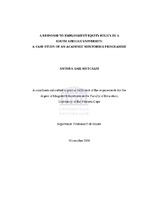A response to employment equity policy in a South African University: a case study of an academic mentoring programme
Abstract
This study investigates the factors that conditioned the establishment of, and responses to, a centrally coordinated, institution wide change initiative aimed at
promoting equity in the academic workplace in an historically white South African
university. It is examined by presenting two kinds of analyses, firstly, an institutional analysis that explores the environmental and managerial conditionalities that influenced the reception, interpretation and responses to the national policy framework. Secondly, a bottom-up analysis that explores the
distinctive disciplinary contexts that conditioned the responses of the participants.
The study reveals that top-down approaches to managing change have limited
capacity to influence the nature and pace of change on the ground, despite the best
intentions of institutional managers. The study illustrates that the distinctive disciplinary context conditioned the responses to, and outcomes of the change
initiative. In this study, the authority of the academic project powerfully trumps the
legitimacy and credibility of the institutional transformation initiative.

